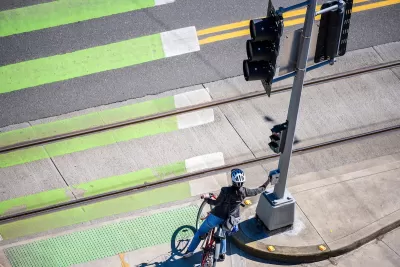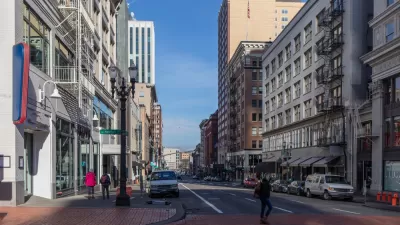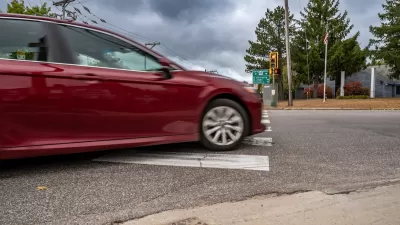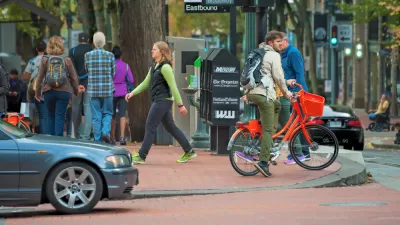A city audit found that the program has failed to reduce traffic deaths and could benefit from a more systematic approach. Meanwhile, PBOT says it needs more state funding to support road safety projects.

A November audit of the Portland Bureau of Transportation’s Vision Zero program calls on the bureau to do more to evaluate the program’s progress as traffic deaths in the cities continue to rise.
As Jim Redden reports in Portland Tribune, “The audit credited PBOT with reducing speed limits across the city and installing more red light enforcement cameras. But it said the effectiveness of some other safety improvements were not being measured.”
The audit calls for a “more systematic approach” that would help the department understand which safety projects are succeeding and which are ineffective.
PBOT spokesperson Dylan Rivera agreed with the assessment but called on the state legislature to increase funding for transportation and safety efforts, saying, “We need the state Legislature to make a big investment in transportation in 2025, by increasing the funding available from the state highway fund that provides the formula funding that cities and counties across Oregon depend on for basic safety, maintenance and livability needs.”
FULL STORY: PBOT: Vision Zero need more money to succeed

Study: Maui’s Plan to Convert Vacation Rentals to Long-Term Housing Could Cause Nearly $1 Billion Economic Loss
The plan would reduce visitor accommodation by 25,% resulting in 1,900 jobs lost.

Americans May Be Stuck — But Why?
Americans are moving a lot less than they once did, and that is a problem. While Yoni Applebaum, in his highly-publicized article Stuck, gets the reasons badly wrong, it's still important to ask: why are we moving so much less than before?

Placekeeping: Setting a New Precedent for City Planners
How a preservation-based approach to redevelopment and urban design can prevent displacement and honor legacy communities.

How the ‘Direct Vision’ Design Approach Saves Lives
Designing large trucks to ensure better visibility for drivers can reduce fatal crashes and improve workplace safety.

San Diego Swaps Parking Lane for Kid-Friendly Mini Park
The block-long greenway will feature interactive play equipment and landscaping.

Tracking the Invisible: Methane Leaks From LA’s Neighborhood Oil Sites
Environmental advocates are using infrared technology to monitor and document methane leaks from neighborhood oil sites, filling regulatory gaps and pushing for stronger protections to safeguard community health and the climate.
Urban Design for Planners 1: Software Tools
This six-course series explores essential urban design concepts using open source software and equips planners with the tools they need to participate fully in the urban design process.
Planning for Universal Design
Learn the tools for implementing Universal Design in planning regulations.
Caltrans
Heyer Gruel & Associates PA
Institute for Housing and Urban Development Studies (IHS)
City of Grandview
Harvard GSD Executive Education
Salt Lake City
NYU Wagner Graduate School of Public Service
City of Cambridge, Maryland





























